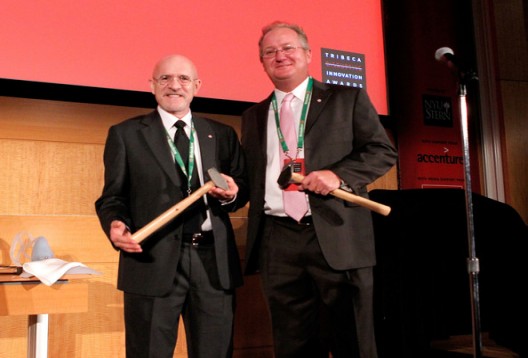From its very first notes, Kevin Carroll’s Tourmaline plays like a genuine classic album — alluringly familiar yet deliciously new and enticing music that obviously springs from its creator’s heart and hits the listener’s own heart as well as mind and soul. Though Carroll is best known as the lead guitarist in Texas country-rocker Charlie Robison’s band The Enablers, it’s anything but a sideman’s solo project or a guitar player’s album. Rather, it’s a rich landmark work of rock’n’roll from a genuine full-fledged musical artist.
Like the mineral it takes its name from, Tourmaline is a gem of many colors and facets. Between the bookends of the “Tourmaline Theme” at the album’s beginning and end unfolds a thematically-linked set of compelling and affecting music with a coherence, eloquence, emotional resonance and musicality that compares to some of the finest rock’n’roll albums that have preceded it. The sound recalls the best artists and moments of AM Top 40 and album rock radio — including stunning parts and figures from Carroll’s guitar — and the songs have a timeless resonance as they explore deep and important human matters with a personal touch. From such meditations as “Another Way,” “Disappear,” “What Was I Thinking?” and the title track to rockers like “Box Of Wine” and “Speed Of Night” to such celebrations of spirit as “Give It Away” and “Make It Feel Good” to the grace note of “At The End Of The Day,” Tourmaline is a vivid pageant of musicality and meaning. In short, it plays like an album for the ages.
Even prior to its release, Tourmaline is evoking critical raves. “Take equal parts of George Harrison’s pop-rock ethereality, the sweet side of Paul Westerburg’s songwriting and the sleek classicist rock’n’roll of Tom Petty & The Heartbreakers, and you have a hint at the riches within Kevin Carroll’s Tourmaline,” says veteran Austin-based music journalist Rob Patterson, reviewer over the years for such rock magazines as Creem, Crawdaddy, Spin, Musician, Request, Harp and many other publications. “It’s a seductive tour de force that plays more and more like one of your all time favorite albums every time you spin it.”
Tourmaline was born out of loss and created from the emotions, wisdom, revelations and personal growth that follow it. The Austin, Texas-based Carroll had already made an initial splash leading his band The Sleestacks with his 1997 album Redemption Day — rated as “an excellent debut” and “a rewarding listen” by All Music Guide — when his mother unexpectedly died from a brain aneurysm. At the same time, the pressures of keeping a band together through everything from low-paying gigs to dodgy major label record deal offers was taking its toll.
“I decided: I’m just done,” Carroll recalls. “I’m going to let go of songwriting. I felt like I was creatively conflicted and trying to force something to happen that should be natural , and it was unhealthy. And I felt like doing that was a betrayal of the music in some way. So I got the idea that maybe I could just play guitar and also that maybe I might make more than $3,000 a year from music by just playing guitar.”
He hit the road with noted Austin folk-rocker Jimmy LaFave for a few months and then signed on with Robison as a guitar slinger, a gig he has held now for nine years running. Meanwhile, the specter of death continued to haunt his life. “A close friend of mine committed suicide, and my grandparents and another friend who lived across the street from me died,” Carroll recalls.
“As I stopped trying to write, I found that songs would occasionally visit me, and more often than not the songs would be inspired by loss. I made a conscious decision to stop pursuing songs as a writer and hoped that they would instead find me. And it really worked.”
Music would seem like it was a natural pursuit for Carroll, who was born is Boise, Idaho on the same day the Civil Rights Act was passed. He got an early taste of show business from his father’s stint as a TV weatherman. And while his mother refurbished rundown buildings into rental properties, Carroll spent his formative years in a dreamlike state listening to AM radio as her work went on around him.
But by the time he hit his teens, Carroll was avidly pursuing a dream of playing college basketball. “That was my life,” he explains. “But then in the first quarter of my first game during my senior year of high school, I broke my hand. I was devastated.”
Redemption, along with some valuable physical therapy for his hand, came in the form of a guitar stashed under his bed. It had been given to him by his maternal grandfather, who had played guitar in country bands in Central Texas during the Great Depression. On Sunday visits to his grandparents, they would watch “The Johnny Cash Show” on television, which was the first time that Carroll heard Bob Dylan, a major inspiration.
Carroll had long been an avid music fan, graduating during his high school years from avid devotion to The Beatles to a near obsession with The Rolling Stones on hearing “Satisfaction” for the first time. “There was something in the combination of adolescence, Catholic school repression and the advent of disco that made the visceral, bluesy vibe of the Stones so appealing. The next year I heard Dylan’s ‘Subterranean Homesick Blues’ for the first time through a pair of headphones, and I haven’t been the same since.”
During his college years, Carroll copped guitar licks from a hotshot Boise player with a regular gig at a local club — Rich Brotherton, now guitarist and producer for Robert Earl Keen. “I would go see him play when I should have been studying, and then go home and try to figure out what he did.” Eventually Carroll landed a spot in a Boise indie cowpunk band, I-84, and started writing songs.
After that group disbanded, he formed The Sleestacks — the name is from the Saturday morning kids show “Land of the Lost” — which quickly rose to the top of the Boise scene. Fired to do more with his music, he followed Brotherton to Austin and persuaded the rest of The Sleestacks to follow him. The band went through the typical rigmarole that promising bands often endure: changing members, being courted by Sire Records (who Carroll eventually turned down) and winning favorable reviews and the start of an audience in Europe.
But even though Carroll gave up leading a band and pursuing his own songwriting to become a hired gun in 1998 — fittingly, it was Brotherton who Kevin replaced for the Robison gig — songs began to come again to him. Eventually he had far more than an album’s worth of material that felt right and true to him and decided it was time to make another album. “It seemed to me like a healthy investment of time and money. What else would I do with my money?” Carroll quips.
“I really wanted to make a record in the style of those made in the 1960s and ‘70s, with an organic feel and sound, but digitally, though with almost all the parts being first takes.” Tourmaline even features such noted players from the era Carroll was emulating as keyboard player Ian McLagan (from The Small Faces and The Faces) and drummer Barry “Frosty” Smith (known for his work with Lee Michaels). Top Austin musicians Ron Flynt and George Reiff provided recording facilities and musical assistance while others like Chris Maresh (Eric Johnson and Toni Price) and and Bruce Hughes (from Poi Dog Pondering, The Ugly Americans and The Resentments) also lent their talents.
The result is a work that’s almost cinematic in its musical, lyrical and emotional splendor, with an impressionistic slant and a loose narrative theme threading throughout. “It’s about loss and people at various stages in that process. I started to feel like I was carving out a niche for myself as the Elizabeth Kubler-Ross of songwriting. Luckily I’ve since been writing songs about lots of other things and have already started working on the next album,” says Carroll.
And out of sorrow and loss emerged something comforting and inspiring as well as an artist who has firmly reconnected with his muse on a new and higher level than ever before. “It’s a once in a lifetime record,” concludes Carroll. “It was a journey, and it was awesome.” And once listeners take the journey with Carroll through Tourmaline, it’s an awesome experience for them as well that they will surely revisit time and time again.
| Date |
Venue |
City |
State |
Note |
| No Tour Dates Available |






 Total Reviews: 5
Total Reviews: 5























